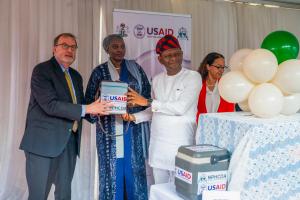Nigeria today received 10 000 doses of mpox vaccines, becoming the first country in the African region to receive doses to respond to the outbreak of the viral disease that has affected several countries and led to the declaration of a public health emergency of international concern by World Health Organization (WHO).
The vaccine, Jynneos (MVA), manufactured by Bavarian Nordic pharmaceutical firm, were donated by the United States government. The vaccines are set to be rolled out in five states with the highest burden of mpox cases. They will be administered in a two-dose schedule to 5 000 people most at risk of mpox, including close contacts of mpox cases and frontline healthcare workers, with a provision for reactive vaccination in other states as the need arises.
“We are pleased to receive this modest initial donation of the mpox vaccine which is safe and efficacious. We will continue to strengthen surveillance and be vigilant to prevent and control mpox. We urge the global health community to expand access to vaccines,” said Hon Muhammad Ali Pate, Nigeria’s Minister of Health.
In preparation for vaccine administration, Nigeria’s National Agency for Food and Drug Administration and Control has granted Emergency Use Authorization for the mpox vaccine. The health authorities have also taken measures to preposition the vaccines to reach priority populations.
“The delivery of the mpox vaccines to Nigeria not only constitutes a crucial addition to the ongoing measures to halt the virus and protect health, it’s also a clear demonstration of international solidarity in the face of global public health emergencies,” said Dr Matshidiso Moeti, WHO Regional Director of Africa. “We are grateful for the generosity of the United States government and look forward to increased global support to effectively address the threat of mpox.”
There are currently serious gaps in mpox vaccine access, especially in Africa. WHO is working with countries and manufacturers to ramp up access to vaccines. WHO Director-General has triggered the process for Emergency Use Listing of vaccines to accelerate vaccine access, particularly for lower-income countries.
WHO is also working with partners like Gavi, the Vaccine Alliance, and UNICEF to enable donations from countries with existing stockpiles. The partners are building a donation scheme so that the limited vaccines are used where they have the greatest public health impact.
Nigeria is scaling up key aspects of outbreak response areas. WHO is supporting the government to strengthen surveillance and contact tracing, laboratory capacity, risk communication and community engagement. The health authorities are also carrying out early case detection and diagnostics, and enhancing cross-border surveillance, including at major points of entry across the country.
The country has reported mpox cases for several years, with a peak in 2022. As of 10 August 2024, there were 786 suspected cases, 39 confirmed cases, with no deaths so far this year.
So far this year, 12 countries in the African region are reporting cases. In total more than 15 000 suspected cases have been reported since the beginning of this year. Out of these, over 3500 cases are laboratory-confirmed, including 26 deaths. WHO is working with national authorities and partners to strengthen response measures in the affected countries and step up preparedness in countries yet to report cases.
World Health Organization







OTHER ARTICLES
Editorial — Prevent, inform, and act for women’s health in Africa
Kenya : Government Prioritises Maternal Health and Strengthens Support for Community Health Promoters
Strengthening pandemic prevention, preparedness, and response capacities in Senegal using the “One Health” approach